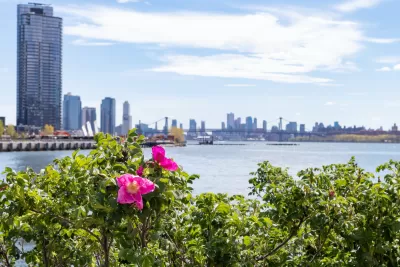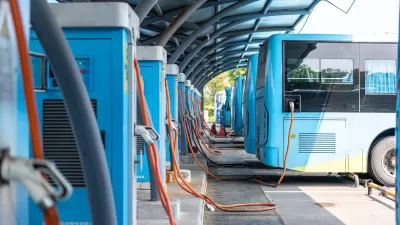As climate change, the pandemic, and a historic housing crisis continue to impact the nation, experts weigh in on the issues that could shape the future of the built environment in 2022.

In a multi-author brief, Brookings staff and senior fellows assess the built environment issues that could dominate 2022.
For Dr. Newsha K. Ajami, the quality of water infrastructure will be a crucial concern as water supplies diminish and demand grows. Ajami suggests investing in the hard and soft infrastructure required for a "circular water economy" that reclaims and reuses water in innovative ways.
Alex Berke draws attention to the proliferation of mobile phone data, the ways planners can use this new source of information about travel and mobility to guide policy, and the ethical implications of managing these datasets.
Anika Singh Lemar notes the long history of racial injustice in American land use and housing policy, calling for a renewed commitment to quantifiable advancements in equity.
Other researchers highlight the importance of hurricane protection projects, federal fair housing enforcement, and addressing capacity deficiencies that prevent communities from accessing federal investments. Additional concerns include broadband infrastructure, the need to reimagine the suburbs for changing demographics and values, transportation funding that supports sustainable transit, and addressing the continuing housing crisis.
At the heart of many of these challenges is the looming threat of climate change, which is causing a strain on resources, increasingly destructive natural disasters, and rising sea levels that threaten coastal communities. Jan Whittington writes that cities must take urgent action to limit global warming by investing in climate-friendly infrastructure and identifying resilience strategies that can be deployed at the city scale.
FULL STORY: Around the halls: Built environment issues that could define 2022

Planetizen Federal Action Tracker
A weekly monitor of how Trump’s orders and actions are impacting planners and planning in America.

Congressman Proposes Bill to Rename DC Metro “Trump Train”
The Make Autorail Great Again Act would withhold federal funding to the system until the Washington Metropolitan Area Transit Authority (WMATA), rebrands as the Washington Metropolitan Authority for Greater Access (WMAGA).

The Simple Legislative Tool Transforming Vacant Downtowns
In California, Michigan and Georgia, an easy win is bringing dollars — and delight — back to city centers.

The States Losing Rural Delivery Rooms at an Alarming Pace
In some states, as few as 9% of rural hospitals still deliver babies. As a result, rising pre-term births, no adequate pre-term care and harrowing close calls are a growing reality.

The Small South Asian Republic Going all in on EVs
Thanks to one simple policy change less than five years ago, 65% of new cars in this Himalayan country are now electric.

DC Backpedals on Bike Lane Protection, Swaps Barriers for Paint
Citing aesthetic concerns, the city is removing the concrete barriers and flexposts that once separated Arizona Avenue cyclists from motor vehicles.
Urban Design for Planners 1: Software Tools
This six-course series explores essential urban design concepts using open source software and equips planners with the tools they need to participate fully in the urban design process.
Planning for Universal Design
Learn the tools for implementing Universal Design in planning regulations.
Smith Gee Studio
City of Charlotte
City of Camden Redevelopment Agency
City of Astoria
Transportation Research & Education Center (TREC) at Portland State University
US High Speed Rail Association
City of Camden Redevelopment Agency
Municipality of Princeton (NJ)





























